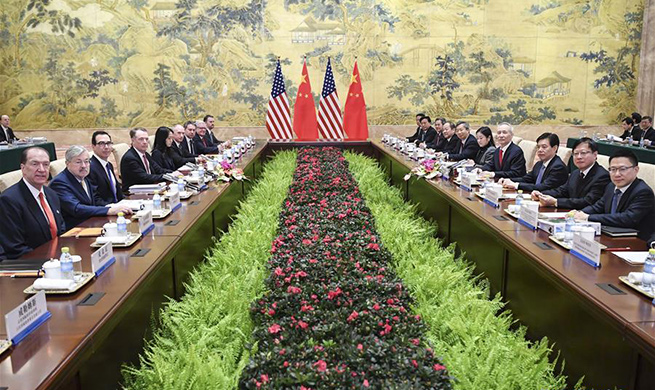NEW YORK, Feb. 14 (Xinhua) -- U.S. stocks traded mixed on Thursday, as sales at U.S. retailers suffered the biggest fall in December 2018 in nine years, and a governor of U.S. Federal Reserve cautioned rising downside risk on the U.S. economy.
At midday, the Dow Jones Industrial Average dropped 105.88 points, or 0.41 percent, to 25,437.39. The S&P 500 fell 7.69 points, or 0.28 percent, to 2,745.34. The Nasdaq Composite Index was up 0.74 points, or 0.01 percent, to 7,421.12.
Shares of Amazon fell more than 1.2 percent around midday, after the U.S. e-commerce giant announced it decided not to move forward with plans to build a headquarters in New York City, due to fierce local opposition.
Shares of U.S. online review site firm Yelp and U.S. resorts operator MGM Resorts declined over 0.7 percent and nearly 6 percent respectively around midday, as widespread worries over sluggish consumer spending offset the better-than-expected fourth-quarter reports of the two companies.
Six of the 11 primary S&P 500 sectors extended losses around midday, with the financials sector and the consumer staples sector down over 1 percent, leading the laggards.
Lael Brainard, a member of the Fed's Board of Governors, said Thursday that she was concerned about the U.S. economy due to increasing "downside risks" in an interview with CNBC.
"Downside risks have definitely increased relative to that modal outlook for continued solid growth," said the central bank policymaker.
Brainard also said in a previous interview with MarketWatch that political uncertainties due to government shutdown and trade tensions would threaten U.S. economic growth.
"As I look at that set of risks, there are things that could get resolved in a very positive way, but of course ...the longer these drag on, the more I worry that they really materially weigh on consumer confidence, business confidence and then start to work their way through activity in the economy," she said.
On the economic front, U.S. retail sales plunged 1.2 percent in December last year, marking the largest decline since September 2009, the U.S. Census Bureau said on Thursday.
The data has been widely regarded as an indication of a marked slowdown in both consumer spending and economic activity by the end of 2018.
The statistics was released in a report postponed by the U.S. government shutdown which lasted 35 days, the longest one in U.S. history.

















